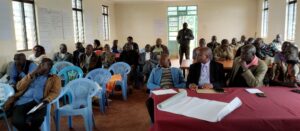EHPEA and TradeMark Africa ink Partnership for Digital Innovation in Ethiopian Horticulture

The Ethiopian Horticulture Producer Exporters Association (EHPEA), in collaboration with TradeMark Africa, has today signed a joint agreement to develop comprehensive e-learning and knowledge management systems tailored to the growing needs of Ethiopia’s horticulture sector. EHPEA’s members will be equipped with advanced tools to enhance their productivity and global market competitiveness. The project is part of a broader programme for the Djibouti-Ethiopia Corridor: ‘Promoting regional economic integration in the Horn of Africa through the development of the Djibouti Corridor’, also funded by the European Union (EU) through the Agence Française de Développement (AfD).
The systems will enhance EHPEA’s capabilities in knowledge management and provide its members with e-learning opportunities. The e-learning platform will offer access to valuable resources, training materials, and interactive modules to improve skills and knowledge sharing in horticulture production and export practices. The platforms include a robust e-learning platform offering flexible, scalable learning solutions and a state-of-the-art knowledge management system that ensures valuable trade insights and best practices are effectively captured and disseminated, aiming to foster a knowledgeable, agile workforce that drives Ethiopia’s horticulture sector forward.
EPHEA Executive Director Mr Tewodros Zewdie highlighted the advanced tools for knowledge management and online learning that the systems will provide, crucial for maintaining competitiveness in the dynamic horticulture sector. “Through this project, we are investing not just in technology but in the future of Ethiopia’s horticulture sector. Our partnership with TradeMark Africa will enable us to equip our members with the necessary resources to thrive in an increasingly digital marketplace. Integrating e-learning and knowledge management platforms in our operations presents myriad opportunities for Ethiopia’s horticulture sector.”
By leveraging digital technologies such as Internet of Things (IoT), data analytics, and cloud computing, EHPEA members can optimise production processes, improve resource management, and enhance market access. For example, IoT sensors can monitor soil moisture levels and weather patterns, enabling farmers to make data-driven decisions regarding irrigation and cultivation practices. This increases yields, conserves resources, and mitigates environmental impact.
Mr. Zewdie explained that data analytics provides insights into consumer preferences, market trends, and supply chain dynamics, empowering exporters, and stakeholders within the horticulture sector to adapt their strategies and offerings accordingly. “By harnessing the power of ICT, Ethiopia’s horticulture sector can foster innovation, improve competitiveness, and sustainably meet the growing demand for high-quality produce in both domestic and international markets,” concluded Mr. Zewdie.
The EU delegation for Djibouti and IGAD, Eloise Roux said, “This project aligns perfectly with the European Union’s goals of promoting digital trade and sustainable economic development. The realisation of this initiative is part of a larger commitment by the European Union to support sustainable development projects across Africa. It is a prime example of how targeted support can facilitate significant advancements in trade infrastructure, benefiting regions such as the Horn of Africa. The funding arrangement for this project underscores the importance of building resilient trade ecosystems that can adapt to the challenges of modern trade and digital transformation.”
During the contract signing event, TradeMark Africa Country Director for Ethiopia, Mr. Ewnetu Taye, expressed enthusiasm about the project’s potential to transform trade practices. “Our support for the EHPEA through this project reflects our commitment to harnessing the power of digital trade tools to drive economic growth and prosperity across Africa. By enhancing the digital capabilities of key sectors like horticulture, we are paving the way for more efficient and inclusive trade practices.”
The implementation of the knowledge management and e-learning systems is designed to ensure that EHPEA members have continuous access to critical training and resources, helping them to stay ahead of industry trends and regulatory requirements. The systems will include features like a centralised knowledge repository, robust search capabilities, version control, and advanced analytics to monitor learning progress and engagement.
Ethiopia’s horticulture sector has experienced remarkable growth in recent years, emerging as an essential contributor to the country’s economy. In the last three quarters of fiscal year 2023, Ethiopia’s horticulture sector capitalised on its strategic location and favourable climate, exporting over 215,800 tons, and generating revenues exceeding $514 million. Flower exports were particularly strong, contributing nearly $444 million. Vegetables and fruits also performed well, earning $57 million and $13.3 million, respectively. These results affirm Ethiopia’s status as a competitive supplier in the global horticulture market, leveraging its geographical and environmental strengths to produce high-quality exports.
Realising the full potential of e-learning and Knowledge Management Systems in Ethiopia’s horticulture sector requires collaborative efforts from all stakeholders. Industry players, including growers, exporters, and logistics providers, must embrace digital transformation and invest in technology infrastructure and capacity building. The integration of ICT in Ethiopia’s horticulture sector promises not only to enhance economic outputs but also to sustainably transform the agricultural landscape, making it a pillar of Ethiopia’s economic development.





